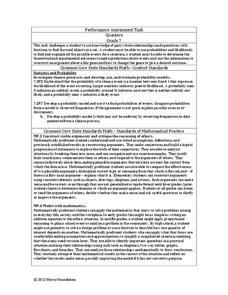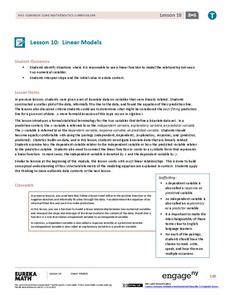Noyce Foundation
Counters
For some, probability is a losing proposition. The assessment item requires an understanding of fraction operations, probability, and fair games. Pupils determine the fractional portions of an event. They continue to determine whether...
EngageNY
Linear Models
Expand your pupils' vocabulary! Learn how to use statistical vocabulary regarding linear models. The instructional activity teaches scholars the appropriate terminology for bivariate data analysis. To complete the module, individuals use...
Mathematics Assessment Project
Statistics and Probability
Quickly assess basic understandings of statistics and probability. The resource contains five quick tasks from the probability and statistics domain. The questions range from finding simple conditional probabilities to measures of center...
Illustrative Mathematics
Boys and Girls, Variation 2
How many ways can you make the number 9? Use a task that has pupils thinking about the many different ways a classroom of nine can be made up of boys and girls.
Illustrative Mathematics
The Pet Snake
Assess how long the class pet snake grew and how long it was when it started growing with a short worksheet. Learners use addition and subtraction strategies with measurements to answer three questions.
EngageNY
Solving a Linear Equation
Solving an equation is the art of creating simpler equivalent equations using properties of equality. Here, classes see that solving an equation is not always as easy as guessing. The lesson presents linear equations that scholars must...
Illustrative Mathematics
Foxes and Rabbits 3
Model periodic populations. Here, in the context of foxes and rabbits, pupils look at graphs of the populations of these animals in a national park over a span of 24 months. Groups analyze the graphs and determine trigonometric functions...
Balanced Assessment
Dinner Date
Determine just how far to run before dinner. The short assessment asks pupils to determine the distance a person can jog in the time left before dinner. To answer the question, scholars determine the distance if the person jogs one way...
Statistics Education Web
The Egg Roulette Game
Hard boiled or raw? Which egg will you get? A hands-on activity has scholars explore the impact of conditional probability. Based on a skit from the Tonight Show, pupils model the selection of the two types of eggs using beads. They...
Illustrative Mathematics
Fred's Fun Factory
Spin to win! Individuals calculate the average number of tickets expected based on a probability distribution for the number of tickets per spin. Pupils use that information to determine the average number of tickets that can be won...
Illustrative Mathematics
Foxes and Rabbits 2
The fox population chases the rabbit population. Groups model the populations of foxes and rabbits with two trigonometric functions. Individuals graph both trigonometric models on the same graph, and then teams determine an explanation...
Illustrative Mathematics
Saving Money 2
Adding money is a key skill in life. Give a activity that requires second graders to find the total amount of money Louis needs to make certain school supply purchases.
Illustrative Mathematics
Fraction Equivalence
Why is six-tenths equivalent to sixty-hundredths? This is the question learners are tasked to explain in writing as well as with a picture.
Shodor Education Foundation
Buffon's Needle
Find the needle on a lined paper. Pupils run a simulation of dropping a needle on a lined paper. The probability of the needle crossing at least one line is pi/2. After each trial, the interactive displays the approximation of pi based...
Concord Consortium
Systematic Solution II
Up the difficulty level by solving a system of equations with variable coefficients. Young scholars devise a plan to solve for x and y in terms of a and b. They represent their solutions as expressions and explain their process and the...
Curated OER
Picture the Problem
Students create an illustration of how to solve math problems. They use appropriate resources for solving the problems. Students have to demonstrate how drawing diagrams and using pictures can help them by using KidPix. On Slide One,...
Curated OER
Best lesson in the whole world!
Students study the concept of fraction using mathematical reasoning. In this problem solving fraction lesson, students use various methods to explain their reasoning in solving fractions. Students use a number of different prompts to...
Curated OER
Probability and Statistics
Learners reason mathematically as they solve problems dealing with probability of an even occurring. In this probability lesson plan, students differentiate between different rankings of candidates running for leadership. They identify...
Curated OER
Ancient Story Problems
Pupils research ancient civilizations, and develop story problems using symbols and coins from those times. They retell these story problems using modern terms and coins.
Curated OER
Transformations
Students identify the types of transformations in their lives. As a class, they determine the ones they have control over and which ones they do not. They practice solving problems in math and oral communication that they are faced with...
Curated OER
Complex Numbers
In this complex numbers worksheet, 9th graders solve 10 different problems that include addition and subtraction of these numbers. First, they add or subtract the coefficients of similar terms algebraically. Then, students remove the...
Curated OER
The Grapes of Math
Students "think" through mathematical problem solving and provide solutions using a variety of strategies after listening to Greg Tang's book, The Grapes of Math.
Curated OER
Peter's Second String
Fifth graders determine the maximum area and range of areas of a rectangle with a given perimeter. They discuss a word problem involving perimeter and area as a class, investigate the word problem using a piece of string, and in small...
Curated OER
Real-World Reasonableness
Fifth graders apply math to real-world situations. In this mathematics lesson plan, 5th graders are read the book, "Math Curse," which discusses ways in which math is used each day. Students then write a sequel to the book in groups,...

























